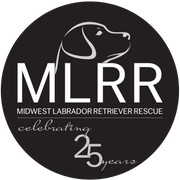Adoption Policies
MLRR does not adopt to families that want an "outside only" dog. All dogs adopted from MLRR will live and sleep inside the home. The dog will not be left outside unsupervised.
The adopter must agree to never let the dog off-leash in an unfenced area. NO EXCEPTIONS.
An electric or invisible fence system is not permitted for outside containment of a dog adopted from MLRR. Although a fenced yard is not required, the adopter must agree to provide an appropriate method for outside containment that is consistent with the off-leash policy above and force-free positive training policies below.
A 'tie-out' (a long rope or chain attached to a stake or other fixed object) is not an acceptable method of containing a dog to the adopter's property.
The dog may not be adopted as a surprise or a gift for someone else. MLRR will work directly with the adoption applicant only (not family members, neighbors, etc.)
The adopter is required to enroll the adopted dog in a basic skills/manners dog training class (or private session) that uses only force-free positive training techniques. If adopting a puppy under 5 months old, the adopter will enroll the puppy in a puppy socialization class immediately after adoption, and in the basic skills/manners class (or private session) after completing the puppy class. MLRR can assist adopters in finding an appropriate professional trainer to comply with these requirements.
The adopter must agree to use only force-free positive training techniques for addressing behaviors and general interaction with the dog throughout the dog's lifetime. Positive training focuses on understanding how dogs experience the world and communicate, and uses positive reinforcement to reward and encourage desirable behaviors. Training techniques based on fear, intimidation, pain, physical punishment, asserting dominance, being the alpha or similar concepts are strictly prohibited, including, for example, the use of shock collars, choke chains, prong collars, electric or invisible fencing, hitting, kicking, pinning, alpha rolls and leash-jerking.
The adopter must be willing to obtain a crate and crate train the dog, if necessary. This is especially important when a young dog is adopted. Crates are also helpful when potty training a dog and as tools to keep dogs safe when the owner is not present to supervise the dog.
The adopter must agree to properly maintain the health of the dog by placing him/her on an annual vaccination schedule under the direction of a veterinarian. The adopter must agree to have the dog tested annually for heartworm, and he/she will receive heartworm preventative by prescription from a veterinarian. Additionally, the adopter must have had their current and/or previous dogs tested annually for heartworm and provided them heartworm preventative by prescription from a veterinarian. If an adopted dog has not already been altered prior to adoption, the adopter must agree to have the dog altered according to the guidelines outlined in the adoption agreement / puppy attachment. All existing dogs of an adoption applicant must be altered, unless there is a medical reason provided by a veterinarian. If an adoption applicant has cats, they must provide proof that the cats have been vaccinated against rabies at a minimum.
When an unmarried couple or roommates want to adopt a dog, the dog may only be adopted in one person's name, and only that person may sign the contract. This helps to ensure that in the event that they split up, the dog will stay with the adopter.
All family members, including any other household pets, must be present during the home visit and when meeting a prospective "adoptee" Labrador to be sure of a good match.
Adoption applicants residing in a townhouse, condominium, apartment or rental property must provide written documentation stating that they have permission from the landlord/homeowner's association to add a dog (the size of a Labrador) to their household. This letter/documentation needs to be attached to the Adoption Application upon submission. Additionally, adoption applicants must understand and abide by their local legal pet limits for detached single-family residences, as well as any single family residence situated within a building or structure containing more than one (1) dwelling unit.
MLRR reserves the right to contact any references or veterinarians named by the adopter on the application form. Family members cannot be listed as references.
All newly approved adoption applications are valid and considered active for one calendar year. After that year has passed, the adoption application is inactive and removed from the approved adoption email list. If the adopter reaches out and asks to adopt a dog, the application will be reactivated. The onus will be on approved adopters to remain in contact with MLRR if they wish to adopt. All adoption applications expire after two calendar years have passed.
Once applicants have adopted an MLRR dog, they will be removed from the approved adopter list. If an adopter who wishes to adopt a second MLRR dog before their two-year adoption application expiration date, they will need to undergo a mini home visit that consists of reference and vet checks. The adopter will also need to provide proof that they took their MLRR rescue to training. Board approval will be required to approve the second adoption.
Adopters who surrender a dog back to MLRR will not be allowed to adopt again until a six-month wait period has passed. If requested, the adopter will need to provide proof that they worked with a trainer and exhausted all options before asking MLRR to take their dog back. The board reserves the right to revoke adoption approval status.
The MLRR Board of Directors reserves the right to change these policies at any time.
Rev. 02/2025
